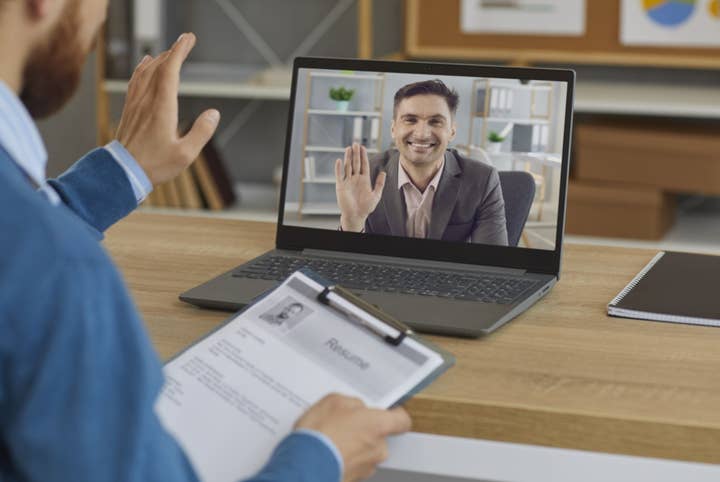How to not ruin your job interview
The games industry share their stories of job interview fails (and not-so-fails)
It's almost 14 years ago that I applied for my first job in the games media.
It was to be the editorial assistant on the weekly business magazine MCV. It was my dream job. The chance to not only be a writer and make magazines, but to do it about video games.
That evening down the pub I told my friend about my application and he was mortified to discover I'd applied via my Hotmail address, which was Dringostarr@hotmail.com.
Had I not been shown how to apply for jobs? Was I not warned about using unprofessional email addresses? I was terrified I'd made a real faux pas.
Well, I got the interview and then the job. Six months later, I found out that my email address had made my boss laugh, and was the primary reason he'd invited me in.
I tell that anecdote because when I put out a call for stories of interviews gone wrong -- the original pitch for this feature -- the vast majority of responses I got back were about mistakes that probably helped them get the job, rather than the other way around.
"During my interview at CD Projekt Red, I actually interrupted [Marcin] Iwiński [joint CEO of CDPR] because a dog walked past his office door and I got very excited. In fairness, it was a whippet and a very good boi. Should note that A) I did get the job and B) Iwinski then told me all about the 'Dogs of CDPR' calendar," tweeted Hollie Bennett, writer, media personality and PR expert who had previously worked for the likes of Bandai Namco and PlayStation.

Indigo Pearl MD Caroline Miller remembers one interview: "One person who interviewed for Indigo Pearl -- who is now rather successful -- accidentally let a minor swear out in their interview. They then told their teacher friend on the way home who convinced them they had blown it. Meanwhile, it made me really like them and they got the job offer."
Playtonic junior game designer Daley Johnson was also worried her behaviour at a job interview with Rare would result in rejection.
"I was offered a coffee after I signed in and waited at reception to be called to my interview. I was already two coffees in and highly jittery, but I gladly accepted. Not thinking, I took a mouthful of the coffee, which was red hot, and spat it out all over my interview shirt. I stifled a little scream and hoped nobody saw.
"Later on while being interviewed in my coffee-stained shirt, a daddy longlegs broke into the interview room via a window. I struggled to sit still and hold eye contact with my interviewers as my worst fear flitted around their heads and mine. I twitched a few times and disguised a screech as laughter at one of my own jokes.
"I later on nervously joked about accidentally slipping on the staircase we were descending and taking everyone out with me. Nobody laughed, just glared at me nervously like I may actually be a murderer. I still somehow managed to get the job."
Another name from the world of video games comms, senior account manager for Xbox/Microsoft at Edelman, Sophie Densham, also had a few unfortunate interview moments. Her former colleagues at UKIE still talk about her interview where she whacked her head on the table when fetching her laptop out of her bag. But there are more.
"My mum and I ended up squabbling in front of the interviewer"
"For my interview for my internship at SpecialEffect, there was a bit of a miscommunication about what was going on and my dad ended up coming along and sitting in with me. They only told me about a year later that they couldn't understand why I brought my dad to a job interview.
"Non-games industry ones include: hitting myself in the face whilst animatedly gesticulating and giving myself an actual nosebleed halfway through and having to leave, and falling completely off the chair in another. So job interviews aren't my forte but I seem to do them all with a certain level of personality and aplomb."
There were countless stories like this. Oddly, three of the responses were around parents being in the interviews. One senior games programmer, who wanted to go nameless, said that his mum insisted on coming along: "We ended up squabbling in front of the interviewer. I cried that night thinking I'd blown it. I got a second call up the next morning, and I just didn't tell my mum until afterwards."
There were plenty of fashion faux pas, too: "I bought a cheap $60 suit for my first interview in QA," said a current game director at a major AAA title. "I ended up dropping chocolate ice cream all down myself 20 minutes before the interview. I was staying at a mate's that evening and had a spare pair of clothes. It was a band t-shirt and some jeans. I couldn't decide what was worse? A chocolate stained shirt and pants? Or a band t-shirt with a hole in it? I went with the t-shirt and kept the jacket over the top.
"It turned out I was far better dressed than both the people who interviewed me. I didn't realise the games industry was so relaxed about this sort of thing. I got the job and I've never worn a suit to a job interview since, not even for [my current role]."
The connective tissue with these anecdotes is that many of the jobs that exist in games aren't about looking smart or being the paragon of professionalism. It was an industry that was built by people who were always a bit different. And now more than ever, with the drive to diversify the workforce, showing bias based on how people look or speak is not only looked upon poorly, but is counter to what the games industry wants to achieve.
The thin line between personality and being unprofessional
The reality is that showing your sense of humour, or being a bit clumsy, or wearing a band t-shirt, or getting over-excited about a dog, only highlights your personality and character. It potentially shows what you add to the team, and how you might fit in.
Of course, there's a difference between not worrying too much about what you wear and being downright unprofessional.
"My mate in games testing got me an interview at a QA agency," reads an email sent in by a 'Dan'. "He spent the evening drilling into me about how cool the place is, and how they don't like suits and you need to just be yourself and relax. Then like a caricature from a TV sitcom, I turned up in a leather jacket and jeans, put my feet up on the chair and even asked if I could smoke during the interview. My mate saw all this from across the room and went and hid in the lunch area because he was so embarrassed. I didn't get the job."
Indie games developer and former head of Kongregate, Emily Greer, recalls one particular interview: "We had a candidate show up with a printed out confidential report from his current employer and started showing me data from it. I had to stop him, tell him to put it away, and explain why that was inappropriate and he was almost certainly violating his employment agreement. I think I let him finish out the interview but it was extremely awkward."
Know your surroundings
"We had a candidate show up with a printed out confidential report from his current employer and started showing me data"
Another classic interview mistake is getting the location wrong. Koch Media's senior global communications manager Daniel Emery turned up at Farnham rather than Feltham for a job interview. We've also had Maidstone and Maidenhead. Hertford and Hatfield.
Being prepared, scouting the location and double checking the locations solves this, but what if the location is something a bit more vague?
"A long time ago I arrived for an interview that was due to take place in a hotel lobby," begins Exient's chief publishing officer Julian Jones. "The only problem was that the hotel was huge -- there were two lobbies -- and packed with both tourists and conference delegates. I did have a phone, but sadly not the interviewer's number and we never did find each other. If your interview is outside of an office environment - say, at a trade show -- make sure you establish comms with the interviewer in advance, so a phone number rather than email, and wear something distinctive if you expect the location to be busy.
"In fact, reconnoitring the layout of a public building in advance would be advisable. If not possible in person, then check out any virtual tours: if nothing else it will alleviate some sense of walking into the unknown. Above all, give yourself time to get lost beforehand and for any delays afterwards. If you're meeting publicly, it could be that your interviewer's schedule could slip too."
Honesty is the best policy
Job interviews are often seen as an opportunity to sell yourself to an employer. It's not something that comes easy to some people who work in games, particularly those who end up in the more technical disciplines like programming. A good employer, especially those eager to improve the diversity of their teams, won't require you to be your own hype person. They should be well versed at looking through the nerves or the showmanship.
In other words, there's no need to embellish and it's ok to not have the answer to every question.
We had a story from someone who applied for a role at a big UK games developer alongside another graduate. They were both asked the same question, and whereas our respondent gave an honest, albeit unflattering, answer, the other person just lied. Honesty, in this case, secured our contributor the job.

The modern way of doing interviews over Zoom or Teams has also opened up new ways to 'cheat' a job interview.
"Don't Google answers during the interview," says Guy Davidson, head of engineering practice at Creative Assembly.
"We had a candidate complain that their camera was a bit dodgy, and it always failed while they were answering questions. Unfortunately, their microphone didn't cut out, so I could hear them typing, and hear them stop typing when the camera came back on. If you don't know the answer, say so: I'm more interested in how well you know your boundaries."
Of course, every business is different and roles in video games vary dramatically. Please don't treat these stories as anything more than they are. I wouldn't recommend applying for a job from a novelty email address, just as Hollie Bennett (I suspect) wouldn't recommend interrupting the CEO of one of the world's biggest games developers to squeal at a dog. What worked for us, probably wouldn't work for you.
But hopefully these stories show you that even if you do spill that bottle of coke, or punch yourself in the face, or panic at the threat posed by a terrifying daddy longlegs, it isn't as disastrous as going to the wrong location, or revealing company secrets.
But if you want some actual, proper interview advice. May I suggest you check out this short guide instead.
More GamesIndustry.biz Academy guides to Working in Games
Our guides to working in games cover various perspectives, from hiring to retention, to landing the job of your dream or creating the right company culture:

